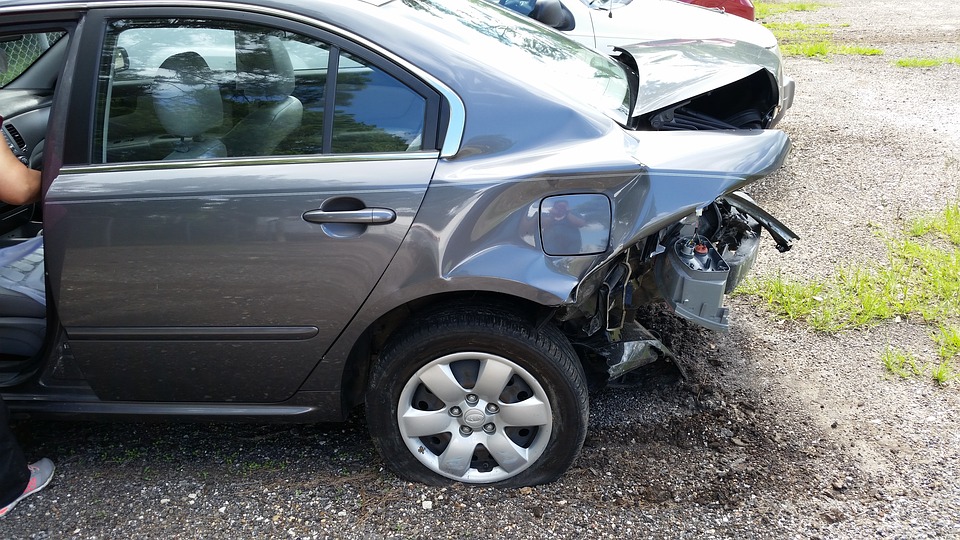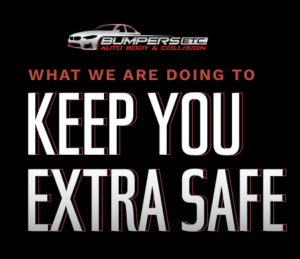As much as we try to avoid them, car accidents do happen. As a matter of fact, about 10 million car collisions take place every year, according to the U.S. Census Bureau; the good news is, most are non-fatal, and a lot of them are fender benders.
When a collision happens, it’s common for many people to panic, and not know what to do next. However, understanding the things that you should do when involved in an accident is highly important.
At Bumpers Etc. Auto Body & Collision, we help people fix their cars after an accident, but we also want to provide help through such difficult time in other ways – so we’ve composed a step-by-step guide you can follow to give you peace of mind and also help with any possible claim:

Move the Vehicle
Whenever possible, pull out of the line of traffic, and turn on your hazard lights.
Call 911
The recommendation from the federal government’s website (911.gov) is to call after “a car crash, especially if someone is injured”.
It’s wise to do so even if no one is hurt, especially if there’s serious damage. Calling 911 or your local precinct ensures a neutral third party will document the accident.
File a Police Report
The insurance company will ask if a report has been filed, so even if it’s just a couple of scratches, do file a police report. Otherwise, you’re leaving room for misinterpretation or misrepresentation of the incident.
You have an option to file a police report later, depending on the state (many police departments allow up to 72 hours). Some states require you to report an accident, and if you fail to do so, you could be cited. Overall, the challenge is that if report is filed later, after all the cars involved have left the scene, the information will not be as accurate.
You may need to report the accident to the DMV, depending on the state and how much damage was done to the car. Per PA DMV, pull reports will need to be completed for many reasons, including insurance claims and driving records. Also, every driver involved in the accident must complete Form AA-600 within 5 days of the accident.
Obtain and Exchange Information
Technically, this is the most important thing to do – both your insurance company and the other driver’s insurance company will need information to determine who pays for the damages.
Before you leave the scene, make sure to exchange names, addresses, phone numbers, driver’s license numbers, tag numbers, and insurance information with all drivers involved in the accident, as well as names and addresses of any witnesses, and full descriptions of all vehicles.
If you, or the other driver(s), do not have your car insurance information handy, the police may ask that the proof of insurance is brought to the police station within 24 hours to avoid receiving a ticket. The police may still hand out a ticket for not having proof of insurance, so it’s highly recommended that you keep either paper or electronic proof of insurance.
In addition, whenever possible take photos of your car’s damage from every angle, pictures of the accident location, making sure to include stop signs and traffic lights, if applicable.
Seek Medical Attention
If a car accident results in bodily injury, the very first thing to do is seek medical attention.
You may feel fine or think your injuries are not serious, but many symptoms can and do appear days after the accident, such as pain, discomfort, dizziness, numbness, etc.
Seeking medical attention quickly also supports your personal injury claim, since waiting several days or weeks will make it harder to prove that your injuries were the result of the car crash.
Take Detailed Notes and Photos of the Injury
If you’re injured, take detailed notes to help you get full reimbursement from the insurance company: names and addresses of any medical treatments, doctors, chiropractors, physical therapists, and other professionals you were referred to after the accident.
Keep bills and receipts for any prescriptions, special equipment (crutches, walkers, canes), special foods, and co-payments, as well as track of travel expenses for medical appointments. Make sure you have proof of financial losses, such as lost wages and opportunities.
Also keep a journal or daily recording of your injuries and medical care, be specific, and include details of the degree of pain and any inconveniences you experience from your injuries.
Keep every form of correspondence with medical professionals during the course of treatment for your injuries, including e-mails and notes that you record during and after telephone calls and doctor’s appointments.
What to Say/Not to Say
Even when you believe you might have been fully or partially at fault for the accident, the best thing to do is to provide an honest report of what happened, without giving your opinion, and let the insurance companies determine the details.
Admitting your fault can seriously affect your insurance claim. Instead of assuming the blame, get a police report, give a detailed description of the accident, along with photos, but do not say to the other party, your passengers, witnesses, or your car insurance company that it’s your fault.
You may have the right to take legal action if there’s a negligent party, and seek compensation for the damages – which is why knowing the steps to take and the relevant laws in your state are crucial.
At Bumpers Etc. Auto Body & Collision, our skilled and dedicated team is here to assist you with our services that range from collision repair to minor bumper repair, and make sure your car is beautiful, healthy and safe for you to enjoy again.
We work with all insurance companies and will make all car rental reservations needed for you.
Contact us to see how we can help you with your car’s repair needs with outstanding service and reliability

